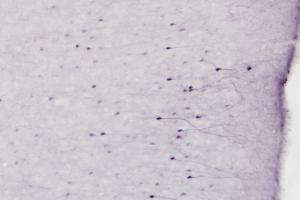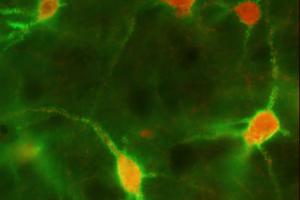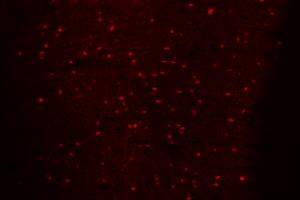
My Expertise
Neuroscience, the adolescent brain, learning, memory, and fear extinction.
Fields of Research (FoR)
Biological Psychology (Neuropsychology, Psychopharmacology, Physiological Psychology), Developmental Psychology and Ageing, Neurosciences, Mental HealthSEO tags
Biography
My research is in developmental psychology and behavioural neuroscience, with a focus on emotional memories across adolescent development.
My body of work primarily examines the behavioural, pharmacological, and neural mechanisms of fear extinction in adolescence, a learning process that reduces fear. It aims to understand the psychological and neural processes underpinning persistent fear in adolescence using animal models. My goal is to...view more
My research is in developmental psychology and behavioural neuroscience, with a focus on emotional memories across adolescent development.
My body of work primarily examines the behavioural, pharmacological, and neural mechanisms of fear extinction in adolescence, a learning process that reduces fear. It aims to understand the psychological and neural processes underpinning persistent fear in adolescence using animal models. My goal is to contribute to knowledge on approaches to reduce distressing memories to ultimately help improve treatments for psychological disorders such as anxiety and post-traumatic stress disorder, and particularly those emerging in adolescence.
My Grants
External Research Fellowships and Grants
-
Australian Research Council (ARC) Discovery Project, 2023-2025, Baker & Richardson, Social buffering of fear inhibition in adolescent rats.
-
ARC Discovery Project, 2022-2024, Baker & Richardson, Dissecting the Brain Circuitry Shaping Fear Regulation Across Development.
-
ARC Discovery Early Career Researcher Award (DECRA), 2017-2019, Baker, Impaired fear inhibition in adolescence: an imbalance in the brain?
-
National Health and Medical Research Council (NHMRC) Project Grant 2015 – 2017, Richardson & Baker, A window of vulnerability: Impaired fear inhibition in adolescent rats.
- NHMRC Peter Doherty Early Career Fellowship, 2013 – 2016, Baker, How is fear inhibited in the adolescent brain?
Industry Collaboration Funding
-
E3D Pharma (formerly CannaPacific Pty LTD; 2021-2022), Richardson, Graham, Baker, Endocannabinoids and fear extinction.
-
UNSW Science Industry Network Seed Funding, Richardson, Graham, Baker, Preclinical testing of novel cannabinoid therapeutic adjuncts for females with anxiety disorders.
Internal UNSW Grants
-
UNSW, Research Infrastructure Scheme 2022, Automated food and water intake measuring system purchase and upgrade, Ong, Begg, Prasad, Furlong, Rafiei, Richardson, Baker.
-
UNSW, Research Infrastructure Scheme 2020, Richardson, Baker, Prasad, Ong, Zimmermann, McNally, Begg, & Killcross, Behavioural Neuroscience Group Expansion to PC2 labs on Level 6 of E26.
- The University of New South Wales, Faculty of Science Research Grant 2014, Baker, Neural mechanisms of impaired fear inhibition in adolescence.
My Qualifications
- PhD in Psychology, Monash University, 2011
- Bachelor of Behavioural Neuroscience (Hons), Monash University, 2005
My Awards
2019: UNSW Women in Maths and Science Champions Program Early Career Scientist https://www.science.unsw.edu.au/unsw-women-maths-and-science-champions-program
2017: Amygdala Function in Emotion, Cognition & Disease (Gordon Research Conference) Travel Award
2017: Early Career Investigator - International Travel Fellowship Award from the Society of Biological Psychiatry (US$2000)
2016: Kucharski Young Investigator Award from the International Society of Developmental Psychobiology
2016: International Society of Developmental Psychobiology Travel Award provided by the NIH (NICHD), Wiley, the Sackler Institute, the Nurture Science Project at Columbia University, and ISDP (US$1200)
2014: International Society of Developmental Psychobiology Travel Award provided by the NIH (NICHD), the Sackler Institute, and the ISDP (US$800)
2014: FENS-IBRO FENS Forum Travel Grant (Euro $750)
2014: European FENS-SfN Summer School 2014 “Neurodevelopmental Psychiatric Disorders”
2013: Amygdala in Health & Disease (Gordon Research Seminar) Travel Award (US$504)
2012: International Society of Developmental Psychobiology Travel Award provided by the NIH (NICHD), the Sackler Institute, and the ISDP (US$750)
2011: Australian Neuroscience Society Student Travel Award
2006 – 2009: Australian Postgraduate Award, Monash University
2009: Undergraduate Psychology Teaching Award (PSY1011), Monash University
2009: Australian Neuroscience Society Student Travel Award
2007: Australian Neuroscience Society Student Poster Prize at IBRO2007
My Research Activities
Research Goals
- Advancing our understanding of how fear is inhibited in the adolescent brain
Research in Detail
My body of work primarily examines the behavioural, pharmacological, and neural mechanisms of fear extinction in adolescence. Within this research program, my work falls into three main areas:
1. Neural mechanisms of fear extinction in adolescence
Despite stunning advances in recent decades in the knowledge of how the adult brain acquires and inhibits fear, significantly less is known about whether the adolescent brain uses the same mechanisms. This is a major gap in knowledge because adolescence is an important time when individuals learn to manage emotions. Many teens struggle with this, as evidenced by anxiety often emerging in this developmental stage. The process of extinction, which involves repeatedly exposing the individual to the feared stimulus/situation in the absence of any danger, is an important component of exposure-based therapies for anxiety disorders. Rats provide an excellent model to investigate the influence of brain maturation on fear extinction.
My empirical studies and reviews have made significant contributions towards understanding the neural mechanisms of fear inhibition in adolescence. For example, my work has shown that even when adolescents exhibit similar behavioural expressions of fear inhibition as younger animals, their brain mechanisms (e.g., recruitment of prefrontal and amygdala regions) can be completely different (Baker & Richardson, 2015).
2. Behavioural and pharmacological approaches to enhance extinction in adolescence
Youth often experience a relapse of anxiety after successful treatment. This has motivated my research to not only examine underlying reasons for why adolescents have difficulties in regulating fear but also novel, effective approaches to help reduce fear. Towards this goal, one stream of my research has focused on behavioural and pharmacological treatments that enhance fear reduction in adolescent rats. For instance, I have demonstrated the effectiveness of a simple behavioural manipulation for improving fear inhibition in adolescent rats (Baker, McNally, & Richardson, 2013 Learning & Memory), a procedure subsequently reported to eliminate fear in human adolescents only two years later (Johnson & Casey, 2015, Science Reports).
Another promising approach to improving exposure therapy is with pharmacological adjuncts (i.e., medications given in combination with behavioural therapies) to enhance the acquisition or consolidation of extinction learning. Rodent studies on fear extinction are extremely useful in testing the safety and efficacy of a wide range of potential adjuncts before clinical trials. Our work has contributed to knowledge on the neural mechanisms underpinning effective adjuncts (e.g, D-cycloserine: Baker, McNally, & Richardson, 2018) and has identified others that are less effective in reducing fear in adolescence than in adulthood (e.g., those targeting the endocannabinoid system or opioid systems; Bisby, Richardson, & Baker, 2020; Bisby, Baker, & Richardson, 2020).
3. Stress hormone and diet-induced dysregulation of brain function and fear memories
An exciting ongoing stream of my research is examining how circumstances like diet and stress exposure alter the mechanisms underlying fear regulation in adolescence. Although this work is fundamental basic research in nature, it aims to investigate factors that people experience in everyday life which profoundly alter brain function and hence behaviour. For example, one of my students found that chronic stress hormone exposure dramatically interferes with two approaches that improve fear regulation in adolescent male rats (Stylianakis et al., 2019). I have also demonstrated that rats fed a high-fat/high-sugar diet in adolescence exhibit impaired fear extinction in adulthood and increased anxiety-like behaviour as well as altered prefrontal brain function (Baker & Reichelt, 2016).
My Engagement
Outreach
2020 - UNSW Aspire Spring Gateway Program Science Faculty neuroscience live session for HSC students
2019 - UNESCO L'Oreal Girls in Science Forum Day
2019 - UNSW Women in Maths and Science Champions Program Early Career Scientist https://www.science.unsw.edu.au/unsw-women-maths-and-science-champions-program
August 2018 - “Speed Meet a Scientist” public event, Sydney Science Festival, Powerhouse Museum
2016 & 2017 - Brain Awareness Week, Rainbow St Primary School class demonstration
Professional affiliations and service positions
I am a member of the Society for Neuroscience, International Society of Developmental Psychobiology, and International Behavioral Neuroscience Society associations.
I was the Chair of a Biological Psychiatry Australia 2015 meeting symposium (September) “Fear and the developing brain across species: Insights into early-life vulnerabilities for anxiety”
My Teaching
Courses I teach
Course Coordinator and Lecturer:
2022 (T2, T3 lecturer)
PSYC1029 - Psychobiology of Sex, Love, and Attraction
2021 (T2, T3)
PSYC1029 - Psychobiology of Sex, Love, and Attraction
2020 (T1, T2, T3 - Newly designed course)
PSYC1029 - Psychobiology of Sex, Love, and Attraction
Lecturer:
2016 - 2022 (1 trimester per year)
PSYC3241 - Psychobiology of Memory and Motivation
2015 (1 semester)
PSYC2081 - Learning and Physiological Psychology
ECH216 - Infancy and Early Development (Macquarie University)
Graduate Programs Lecturer:
From 2021
PSYC5113 - Developmental Neuroscience; Graduate Certificate in Child Development
From 2019
PSYC5005 - Neurobiology of Memories; Graduate Diploma in Psychology
Location
University of New South Wales
Sydney NSW 2052
Mathews Building
Room 507


